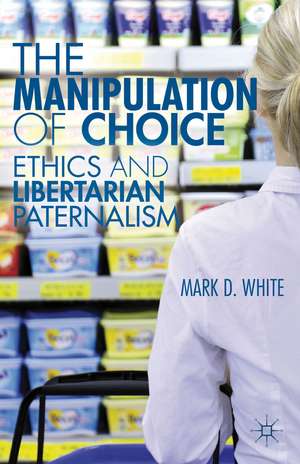The Manipulation of Choice: Ethics and Libertarian Paternalism
Autor M. Whiteen Limba Engleză Paperback – 4 feb 2013
This book is part of White's triptych on individualism and society, which includes The Illusion of Well-Being and The Decline of the Individual.
| Toate formatele și edițiile | Preț | Express |
|---|---|---|
| Paperback (1) | 634.32 lei 6-8 săpt. | |
| Palgrave Macmillan US – 4 feb 2013 | 634.32 lei 6-8 săpt. | |
| Hardback (1) | 638.43 lei 6-8 săpt. | |
| Palgrave Macmillan US – 4 feb 2013 | 638.43 lei 6-8 săpt. |
Preț: 634.32 lei
Preț vechi: 746.26 lei
-15% Nou
Puncte Express: 951
Preț estimativ în valută:
121.38€ • 127.31$ • 101.04£
121.38€ • 127.31$ • 101.04£
Carte tipărită la comandă
Livrare economică 01-15 aprilie
Preluare comenzi: 021 569.72.76
Specificații
ISBN-13: 9781137287762
ISBN-10: 1137287764
Pagini: 185
Ilustrații: XV, 185 p.
Dimensiuni: 140 x 216 x 13 mm
Greutate: 0.25 kg
Ediția:2013
Editura: Palgrave Macmillan US
Colecția Palgrave Macmillan
Locul publicării:New York, United States
ISBN-10: 1137287764
Pagini: 185
Ilustrații: XV, 185 p.
Dimensiuni: 140 x 216 x 13 mm
Greutate: 0.25 kg
Ediția:2013
Editura: Palgrave Macmillan US
Colecția Palgrave Macmillan
Locul publicării:New York, United States
Cuprins
The Problem with Economic Models of Choice How Behavioral Economists Make These Problems Worse, Not Better How Behavioral Economics Met Law-and-Economics and Begat Nudge Why Nudge Can't Work Why Nudge Is Unethical Why Nudge Will Backfire in the Long Run Why Nudge is Paternalistic (and Hardly Libertarian) - and Why Paternalism Is Wrong Why Choice is Valuable and Should Be Yours to Make
Recenzii
"The 'libertarian paternalism' theory promises to use the state to help correct citizens' wrong decisions without asking their consent, yet also without truly entering the realm of coercion. Too good to be true? Indeed it is, as this book helps to show. Mark White gives us the sort of analysis we need to nudge back." - Walter Olson, Senior Fellow, Cato Institute, USA
"The Manipulation of Choice states that paternalists impose their own values and goals onto hapless consumers and citizens. Hence, public policies designed to correct the imperfections of behavioral irrationality are coercive. This is an important point and one that needs to be debated." - Jonathan B. Wight, Professor of Economics and International Studies, University of Richmond, USA
"An important book on a timely topic. The Manipulation of Choice is an accessible book that is especially well suited for students. But it is also a welcome challenge to a currently fashionable theory that libertarians andpaternalists alike should read with pleasure. Mark White . . . challenges the moral foundations of the entire research program." - The Independent Review
"The work is a solid, compelling read for anyone interested in a concise but comprehensive account of the case against libertarian paternalism and its theoretical foundations. In the course of battling libertarian paternalism and its underlying theories, White simultaneously builds a positive case for individual freedom in defence of more traditional, non-paternalistic paradigms of libertarian philosophy and economics." - Erasmus Journal for Philosophy and Economics
"White addresses our increasing faith in quantification . . . The more relentlessly you measure people's behavior, the greater the temptation to steer that behavior in subtle and sometimes not-so-subtle ways . . . A quantified state optimizes outcomes by narrowing possibilities - and establishing 'efficiency and uplift for all' as the new national mandate.You don't need a sophisticated sensor network to register that as a step backward." - Greg Beato, Reason, on The Manipulation of Choice and The Illusion of Well-Being
"The Manipulation of Choice states that paternalists impose their own values and goals onto hapless consumers and citizens. Hence, public policies designed to correct the imperfections of behavioral irrationality are coercive. This is an important point and one that needs to be debated." - Jonathan B. Wight, Professor of Economics and International Studies, University of Richmond, USA
"An important book on a timely topic. The Manipulation of Choice is an accessible book that is especially well suited for students. But it is also a welcome challenge to a currently fashionable theory that libertarians andpaternalists alike should read with pleasure. Mark White . . . challenges the moral foundations of the entire research program." - The Independent Review
"The work is a solid, compelling read for anyone interested in a concise but comprehensive account of the case against libertarian paternalism and its theoretical foundations. In the course of battling libertarian paternalism and its underlying theories, White simultaneously builds a positive case for individual freedom in defence of more traditional, non-paternalistic paradigms of libertarian philosophy and economics." - Erasmus Journal for Philosophy and Economics
"White addresses our increasing faith in quantification . . . The more relentlessly you measure people's behavior, the greater the temptation to steer that behavior in subtle and sometimes not-so-subtle ways . . . A quantified state optimizes outcomes by narrowing possibilities - and establishing 'efficiency and uplift for all' as the new national mandate.You don't need a sophisticated sensor network to register that as a step backward." - Greg Beato, Reason, on The Manipulation of Choice and The Illusion of Well-Being
Notă biografică
Mark D. White is Chair of the Department of Philosophy at the College of Staten Island, City University of New York, USA, where he teaches courses in philosophy, economics, and law. He is the author of four books, including The Illusion of Well-Being (2014) and The Manipulation of Choice (2013), plus over forty journal articles and book chapters in the intersections between his three fields. He has also edited or co-edited a number of books, including Retributivism (2011), The Thief of Time (with Chrisoula Andreou, 2010), and Theoretical Foundations of Law and Economics (2009), and he is the editor of the Perspectives from Social Economics series at Palgrave Macmillan.
















